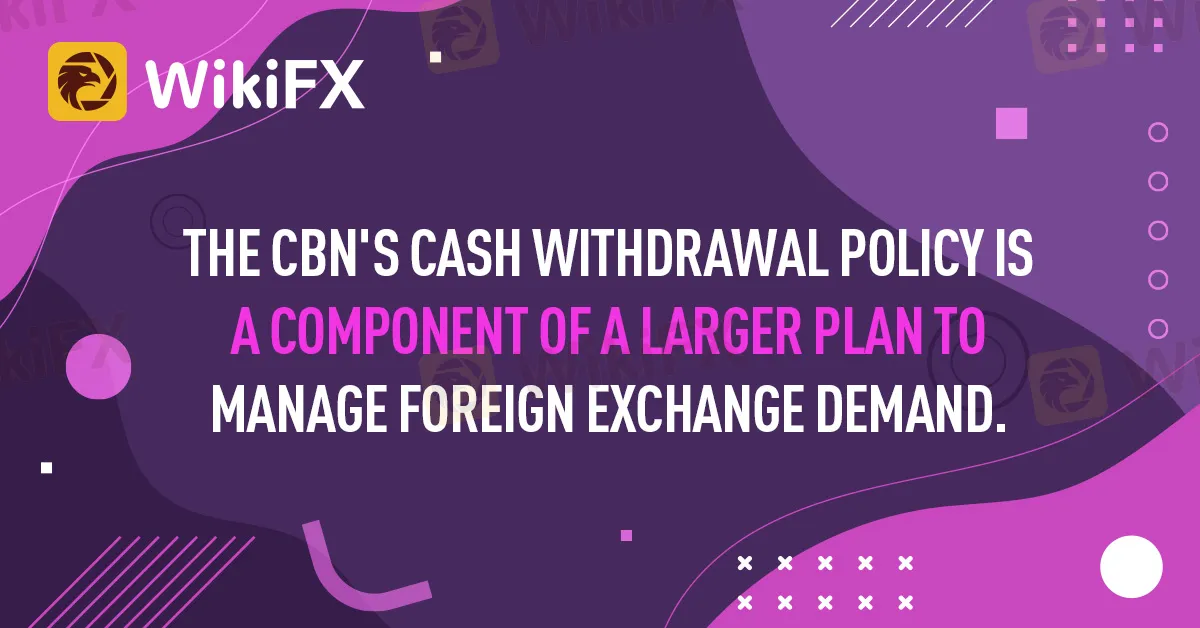简体中文
繁體中文
English
Pусский
日本語
ภาษาไทย
Tiếng Việt
Bahasa Indonesia
Español
हिन्दी
Filippiiniläinen
Français
Deutsch
Português
Türkçe
한국어
العربية
THE CBN'S CASH WITHDRAWAL POLICY IS A COMPONENT OF A LARGER PLAN TO MANAGE FOREIGN EXCHANGE DEMAND
Abstract:On Tuesday, December 6, 2022, the central bank of Nigeria said that it was ordering banks to make sure that weekly over-the-counter cash withdrawals by both individuals and business entities would not exceed N100,000 and N500,000, respectively.

On Tuesday, December 6, 2022, the central bank of Nigeria said that it was ordering banks to make sure that weekly over-the-counter cash withdrawals by both individuals and business entities would not exceed N100,000 and N500,000, respectively.
The altered cash withdrawal policy, according to the central bank, was made in response to the introduction of the newly redesigned naira notes, which are in line with its cashless agenda.
· Why is the central bank restricting Nigerians' ability to collect money?
· Is it the cash-less policy?
· Is the goal of this new policy to attack politicians?
We must go back to the origins of the central bank behind this approach.
Our argument contends that the central bank's obsession with the exchange rate is the cause of this policy. The emphasis has been on resolving the forex difficulties, from the era of the ban on 41 products through the restriction on cryptocurrency transactions and the reduction of forex outflows.
Financial inclusion: The National Financial Inclusion Strategy (NFIS), which the central bank renewed in 2018, is one of its most significant measures.
· “Increased access to finance for MSMEs as a result of financial inclusion (loans made on the back of mobilized savings) will lead to improved productivity, increased non-oil exports, foreign exchange profits, and this will stabilize the value of the Naira,” is one of the objectives of the NFIS.
· As a result, an MOU was signed with the NCC, and finally Telcos received licenses to launch payment service banks.
· Then, it made the decision to step up its mobile money programs, lower bank fees, promote agent banking, and implement other regulations to uptake cash-less projects.
Demand Side Policies: The apex bank has implemented a number of policies over the past two years to manage the demand and supply sides of the FX market in addition to its NFIS strategy.
· Central bank said in September 2021 that it would no longer make dollars accessible for the purchase of weapons.
· A few months earlier, in July 2021, the CBN made the decision to stop allocating dollars to BDC operators, explaining that they had turned into a conduit for shady financial transfers and collaborated with unscrupulous individuals to carry out money laundering in Nigeria.
· The central bank continued its supply-side initiatives this year by introducing the computerized Form A and Form NCX, respectively. The RT 200 strategy also sought to entice exporters to send their foreign currency in return for rebates.
· Let's not forget the Naira4dollar initiative, which was started early in 2021 to promote remittances from the diaspora through authorized channels.
· The apex bank restrictions on intra-bank currency transactions and severe verification requirements on inter-bank currency transfers.
Introduction to the eNaira: The creation of the eNaira was a result of the central bank's effort in financial inclusion plan, which aimed to achieve FX stability.
· The central bank said that the eNaira cost-effective mechanism for remittances and ultimately improve remittance flows when it first debuted in October 2021. As remittance costs will be incredibly low, it would also decrease the amount of money moving through unofficial routes. Remittances will eventually become quicker, cheaper, and easier thanks to the eNaira.
· Remittances are once more correlated with boosting Nigeria's foreign exchange reserves and achieving currency stability. It is sufficient to note that Nigeria receives an average of $20 billion annually from it.
· Although transaction volumes have topped N8 billion since the eNaira's inception, the apex bank estimates that there are still roughly N2.3 trillion worth of dollars in circulation outside of banks, so the currency is far from being controlled.
· Additionally, Nigeria's money supply, which is around N50 trillion, is what's driving one of the biggest increases in goods and services. However, Nigeria's soaring black market exchange rate is the most important result of so much cash in circulation.
Key message: In order to address Nigeria's exchange rate issues through demand and supply-side management, the apex bank is obsessed on having better control and monitoring of the country's money supply throughput.
· It thinks it can use these coordinated strategies to regulate demand and encourage the supply of foreign exchange.
· Therefore, we believe that the central bank expects a coordinated and meticulous implementation of these policies to aid in boosting external reserves, preserving exchange rate stability, and boosting GDP growth rate.
· These strategies have so far failed to accomplish either of the two aforementioned objectives—price stability or FX control.
· But is the implementation of the decrease in cash withdrawals the last piece of the puzzle needed to achieve these objectives, or may it soon cause another change?
· Time will only tell.

Disclaimer:
The views in this article only represent the author's personal views, and do not constitute investment advice on this platform. This platform does not guarantee the accuracy, completeness and timeliness of the information in the article, and will not be liable for any loss caused by the use of or reliance on the information in the article.
Read more

WikiFX App Version 3.6.4 Release Announcement
We are pleased to announce that WikiFX App Version 3.6.4 has officially been released. This update includes significant functional optimizations. Below are the key updates.

Plunging Oil Prices Spark Market Fears
International oil prices have declined for two consecutive days, mainly due to the impact of U.S. tariff hikes, which have intensified market concerns over a global economic slowdown.

Black Monday for U.S. Stocks: What Happened?
The U.S. stock market suffered another major blow, with all three major indices tumbling and tech giants losing over $830 billion in market value. Market panic intensified, recession concerns escalated, and the Federal Reserve’s policy direction became a key focus.

Gold Prices Fluctuate: What Really Determines Their Value?
Gold prices have been fluctuating recently, influenced by multiple factors. Since the beginning of 2025, gold has risen by 11%, hitting new historic highs multiple times in the first quarter.
WikiFX Broker
Latest News
Beware: Online Share Buying Scam Costs 2,791,780 PHP in Losses
5 things I wish someone could have told me before I chose a forex broker
Unmasking a RM24 Million Forex Scam in Malaysia
U.S., Germany, and Finland Shut Down Garantex Over Money Laundering Allegations
What Impact on Investors as Oil Prices Decline?
Gold Prices Fluctuate: What Really Determines Their Value?
Dollar Under Fire—Is More Decline Ahead?
Plunging Oil Prices Spark Market Fears
Celebrate Ramadan 2025 with WelTrade & YAMarkets
WikiFX App Version 3.6.4 Release Announcement
Currency Calculator






